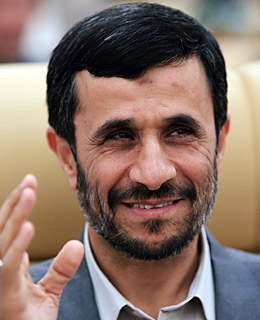
Iranian President Mahmoud Ahmadinejad
Ahmadinejad is undoubtedly the biggest loser. Having made the cause of Palestinian militancy his own, Ahmadinejad urged that Israel be "wiped off the map." He also stirred international controversy, and exasperated some in his own government, by questioning the fact of the Holocaust. But Iran was left badly isolated when the U.S. managed to bring 49 parties to Annapolis, including Tehran's only real Arab ally, Syria. Ahmadinejad's embarrassment shows. Speaking by phone on the eve of Annapolis to Saudi Arabian King Abdullah bin Abdulaziz al-Saud, he said that he "wished" the Kingdom had boycotted the conference. Then Ahmadinejad's office announced that Iran would hold its own Middle East conference, "within the next week or two." It will take longer than that to know whether the envisioned year of negotiations is going to bear any fruit. But the thing about the Middle East is that today's losers can wind up tomorrow's winners. If Annapolis fails to achieve its promise, Iran may become the biggest victor of them all.